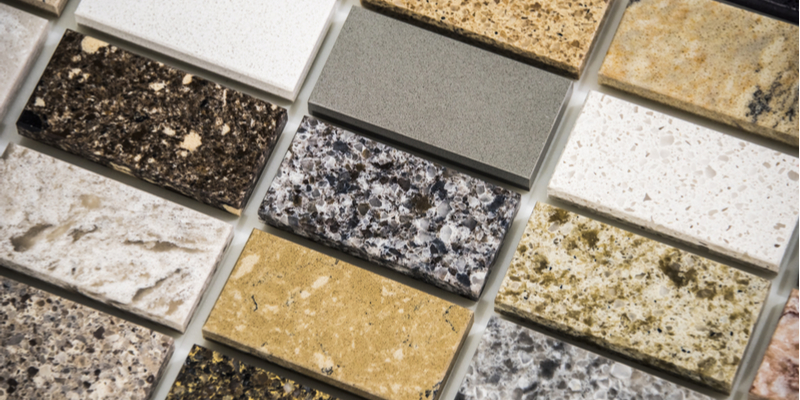There are few areas of kitchen design which spark debate as much as countertop material – granite and quartz in particular. Look in any design magazine, kitchen blog, or house flipper show, and you’ll see its true. Let’s look at both materials, discover the differences and similarities, as well as the aesthetics. And while there are no promises regarding the resolution of this age old debate, you’ll most certainly be better informed when the time comes to make your decision for your own kitchen – and that is what really matters.
Granite and Quartz Defined
Granite is a very hard, 100 percent all natural, igneous rock. Mined around the world, granite is a crystalline stone composed of mica, quartz, feldspar, and other minerals. Once mined, granite is cut to practical sizes and polished to perfection. It comes in a variety of colors with the most common being gray, white, and pink. Granite countertops are made of this 100 percent natural material.
Quartz, is a mineral, the second most common on earth, also 100 percent natural. The different is quartz countertops are manufactured from 95 percent ground all natural quartz combined with five percent polymer resins.
Aesthetics
Granite countertops are available in a variety of colors and patterns as the rock is formed by the cooling and solidifying of molten materials. With granite, you can make the choice between a very subtle pattern or an extremely unique patter, with not two countertops ever alike.
Quartz countertops continue to grow in popularity because it offers the look of natural stone, but can still be customized. With quartz, homeowners will find selecting a quartz countertop to match their color and style much easier than finding the perfect piece of granite to do the same.
Endurance
The endurance, that is durability and strength, of your countertop is important.
Granite presents as extremely durable and resistant to heat. But even so, it is porous in nature, meaning liquids can stain it. In addition, a strong blow to granite will likely cause damage.
Quartz is the harder and more durable of the two, with quartz being virtually impervious to powerful impacts and liquids. It can, though, be damage by excess heat.
Maintenance
Granite counters need to be cleaned with soap or a mild household cleaner and water every day. It is important to remember oils and acids may stain your granite. In addition, your granite countertops should be resealed annually to increase their longevity.
Likewise, quartz should be cleaned daily with soap and water. And potholders should be used for any item excessively hot that is placed on the countertop. Otherwise, that’s it for the maintenance of indestructible quartz.
Costs
The two come it around the same costs, with granite in an average kitchen coming in at $2,000 to $4,000 and quartz averaging $1,500 to $5,500. In both cases, you may be able to save some money by doing some of the preliminary work, but you should have your granite or quartz countertops professionally installed.
Environmental Friendliness
Granite arrives in your kitchen after having been quarried and transported to your home. So, should you choose an exotic high-end piece, transportation negates environmental friendliness. You can increase the environmentally friendly factor of granite by choosing granite that has been salvaged or mined closer to your home.
Quartz, as engineered material, often uses regionally manufactured stone created by local fabricators which often makes it the more environmentally friendly of the two.

